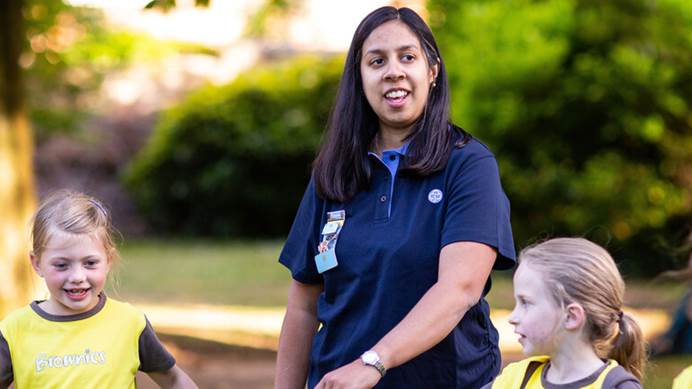Activities to help you talk about mental health in unit meetings
From Girlguiding and other organisations
Mental Health Awareness Week is a chance for everyone in the UK to focus on their wellbeing.
Organised by the Mental Health Foundation, this year’s theme is loneliness, raising awareness of the impact social isolation has on mental wellbeing because reducing loneliness is a major step towards a having a mentally healthy society.
In 2022, Mental Health Awareness Week runs from 9-15 May, and we’ve put together some ideas and resources to help you start a conversation in your unit about mental health this week or at any time of the year.
Girlguiding resources
Colour my mood
This activity, which was made with Rainbows in mind, helps girls understand emotions and think about who they can talk to about their feelings. Download the resource for free.
Happy thoughts
This activity was made with Brownies and Guides in mind. It shows them how to create and use a mindfulness jar to help clear bad thoughts. It also includes some mindfulness techniques to practice.
Download the resource for free.
Take a moment
This activity was made with Guides in mind. It gives girls the chance to learn calming techniques and learn the signs of a panic or asthma attack. Download the resource for free.
Checking in
This activity, which was made with Guides in mind, gives girls the chance to carry out a guided body scan meditation. It also includes tips for how to transform their space into a place of tranquillity.
Keeping afloat
This activity was made with Rangers in mind. It gives girls the chance to think about why support networks are important and how they can create a support network of their own. Download the resource for free.
Think resilient
Our Think Resilient resources are designed to encourages girls to talk about their mental wellbeing and the pressures they experience. The activities were made with Brownies, Guides and Rangers in mind.
E-learning
Our mental health e-learning will help you support those who are struggling with mental health difficulties and takes about 35 minutes.
Resources from other organisations
The Mental Health Foundation has put together a free pack for schools on loneliness that can be adapted for use in a unit meeting. It’s all about different ways people can connect with themselves, others and the world to feel less lonely. It’s aimed at secondary school aged children, so would be ideal for Guides and Rangers.
It includes an adaptable lesson plan and an assembly plan with PowerPoint slides and a script which you could adapt for your meeting, worksheets and posters you could put up in your meeting place.
It also has guides for young members, adult volunteers and parents and carers on understanding what loneliness is, how it can affect our mental health and how children and young people can find connections with themselves, others, and the world around us to feel less lonely.
Time to Change also has lots of resources aimed at Guide and Ranger ages. There are lessons and assemblies that can be adapted for a unit meeting, short activities, guides and toolkits and films. There’s also links to training for adults and information for parents and carers. We love the What is mental health? PowerPoint that provides a great starting point for chatting about wellbeing. We like the fun quiz and the informative short films too, which are especially good if you’re still meeting virtually or if sharing a screen is an option.
Childline has some awesome ideas too, especially for the younger sections. You could print off the mental health first aid kit worksheets and fill them out in a meeting, getting young members to think about what will help them.
And their coping kit has ideas for staying calm. They aren’t all possible to do as part of a unit meeting, but some of the ideas, like making shadow puppets, standing confidently and learning a new song will. There are six different types of activities and there’s loads of them! And the ones you can’t do at your meeting could be something young members try at home instead.
There’s lots more in their toolbox section that young members can try using when the meeting’s over, like games, videos and message boards.
YoungMinds have been working with Beano to make some resources about resilience, or ‘bouncebackability’! There are six lessons, five of them are suitable for Key Stage 1, ages four to seven, and Key Stage 2, ages seven to 11. One of them is just made for Key Stage 2. You’ll need to register to download them, but you can put your unit name in as the school instead.
Need extra support?
Our Mental health and guiding webpage has signs to look for if someone’s struggling, links to other support organisations, supporting members and tips for starting conversations. For extra support, you can contact your local commissioner who may also be able to put you in touch with a local inclusion adviser. You can also contact [email protected] for advice from our HQ inclusion team. Always follow the Girlguiding safeguarding procedure if you have a concern about a member’s safety or welfare.



